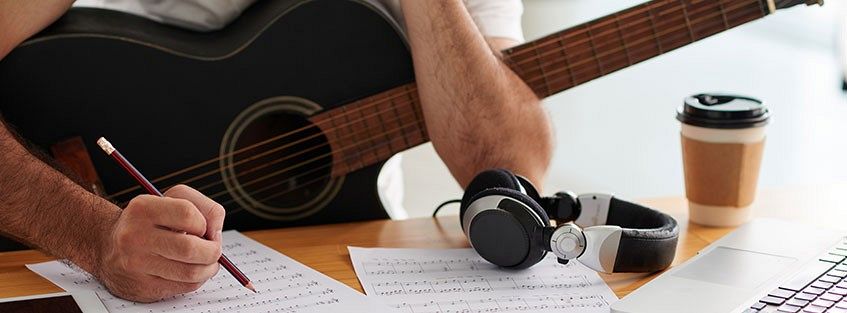
This article is the second of a six-part series. The series is meant as a legal checklist for musicians as they plan to release their music. In this second article, I try to provide a glimpse into how copyright law works. In this article, you will learn:
Please make a note! Every explanation of law should start with “With some exceptions.” There are many exceptions and distinctions that exist, and it is far too burdensome to explain each one. It is important to know the basics so you know when legal consequences exist, but it’s also important to hire a lawyer to guide you through the exceptions and distinctions.
There are many myths surrounding when/how one would obtain copyright protection. Here is the answer: REGISTRATION IS NOT REQUIRED, YOU OBTAIN COPYRIGHT PROTECTION WHEN YOUR COPYRIGHT IS CREATED IN A TANGIBLE FORM.
You gain copyright protection when your work is “fixed in a tangible medium of expression.” That is the legal term of art provided by the U.S. Copyright Act. In other words, once the copyrightable material is fixed in some way, you automatically obtain copyright protection.
So compare: You get on stage and fiddle around with your guitar, making a new tasty lick you’ve never written/recorded before. It’s not copyright protected if you aren’t recording it because it’s not fixed in a tangible form.
However, if you first write the notes to your tasty lick, then get on stage and perform, it became protected when it was written down, because it is a fixed, tangible form.
So when you get “copyright protection” after fixing your copyright in a tangible form, what exactly are you getting? The Copyright Act gives you exclusive (only you have these rights) rights to do the following with your copyright:
The obvious answer: People can’t steal, copy and/or make money off your work without your permission.
The not-so-obvious answer: You can sell or issue “licenses” (a limited right) to third parties for these specific uses and MAKE MONEY. A common example is “selling” your song to a record label in exchange for an up front fee (i.e. an advance) and percentage of money from the sale of the song.
This is why it is very important to come up with a unique name that you know for certain (1) is not already a registered trademark for use as a band name, and (2) is not being used anywhere else in the country.
The obvious question if your copyright is automatically protected when it is fixed is “then what is the point of registering your copyright?” There are still some major benefits to registering your copyright, including:
Keep in mind, copyright registration is done online and is only $35. Without going into detail, there are some scenarios you can register your entire album for $35. It’s worth it to gain these above protections.
While I won’t go into detail into all these other factors, they are extremely important and are a need-to-know for musicians...
Joint Works – If you and another musician intend to contribute to one single work, then you have a “joint work.” Cannot separate – Once joined, the copyrights cannot be separated. It is like mixing the yolk with the egg white, you can’t return them back to their separate form.
For example, once you contribute music and lyrics into one song, it stays like that forever. You can’t decide to take the music you contributed and go use it in another song.
Equal ownership – Without otherwise agreeing in writing, all contributors own the joint work evenly amongst each other regardless of their amount of contribution.
Ownership Rights - All joint authors then have the right to issue non-exclusive licenses without the consent of the other co-owners, so long as they pay the owners in proportion to the amount earned.
Music Sampling – When you take a piece of a sound recording you don’t own and use it in your own song, just assume you are infringing if you don’t obtain consent. Their a some very limited exceptions to this rule, but the thought that a certain amount of seconds is OK is a MYTH!
Compositions, Sound Recordings and Videos – When you record your song, there are two copyrights that attach: the actual sound recording (i.e. the master) and the underlying written song (i.e. the composition). If you then record a music video using that sound recording, then there are three copyrights that attach: the master, composition and the music video itself.
Covering a Song – Keep this in mind. As you might know, you have the automatic right to record a cover song of an existing song out in the public, but it’s limited to song records. If you make a video it’s not legal without the consent of the songwriter (however, places like YouTube have procedures in place to obtain permission when uploading the cover song).
 |
About Colin Maher, Esq.Colin Maher is the founder of Whiskey Ghost Entertainment based in Nashville, TN. Colin has represented independent musicians, record labels and publishers with a wide array of representation including the drafting, review and negotiation of record/publishing deals, distribution and band agreements. He has also assisted in the formation of LLC’s, trademark registration and much more. If you have a legal question, please don’t hesitate to email Colin at cmaher@whiskeyghost.com or call him at 615-721-2233. You can visit his website at www.whiskeyghost.com This article does not create an attorney-client relationship between you and me. Your use of this website is intended for -general information purposes only and is not legal advice or a substitute for legal counsel. You should not act upon any information contained on this website without seeking professional counsel, licensed to practice in your jurisdiction for a -particular problem. |
We make it easy for you to discover emerging music artists, participate, and support Nashville's diverse local music scene.